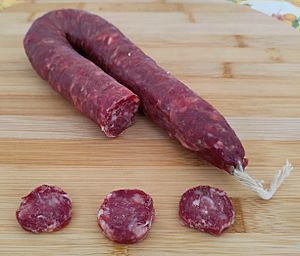Lucanica facts for kids
Lucanica was a type of tasty pork sausage that people in Ancient Rome loved to eat. It was a simple, "rustic" food, meaning it was made in a traditional, hearty way. This sausage was often spicy and sometimes smoked to preserve it.
Contents
What Was Ancient Lucanica?
Lucanica was a special kind of sausage from long ago. It was often made from pork, but sometimes from beef. Ancient writers like Apicius, who wrote a famous cookbook, described it as a spicy, smoked sausage. It originally came from a region in southern Italy called Lucania.
How Did Lucanica Get to Rome?
Historians like Cicero and Martial tell us that Roman soldiers or enslaved people brought this sausage to Rome from Lucania. It became very popular throughout the Roman Empire.
Lucanica's Legacy: Sausages Around the World
The name "lucanica" was so famous that it inspired many other sausages we eat today! You can find similar sausages, often with names that sound like "lucanica," in many countries. These sausages can be fresh, cured (preserved), or smoked.
Here are some examples of sausages that got their name from the ancient lucanica:
- Italian: Luganega or lucanica
- Portuguese and Brazilian: Linguiça
- Bulgarian: Lukanka or loukanka
- Macedonian: Lukanec or lukanci
- Albanian: Likëngë or lekëngë (also llukanik in Albania)
- Greek: Loukaniko, which is often flavored with orange peel
- Spanish, Latin American, and Filipino: Longaniza, which can be fresh or cured
- Arabic: Laqāniq, naqāniq, or maqāniq, often made with mutton and semolina
- Modern Hebrew: Naqniq, which is a general word for "sausage"
- Basque: Lukainka
- Croatian: Luganiga, sometimes flavored with cinnamon
Lucanica Today
Today, a sausage called Lucanica di Picerno is still made in the Basilicata region of Italy. This area was part of the ancient Lucania. It's a direct descendant of the original Roman lucanica sausage.
 | Bayard Rustin |
 | Jeannette Carter |
 | Jeremiah A. Brown |


